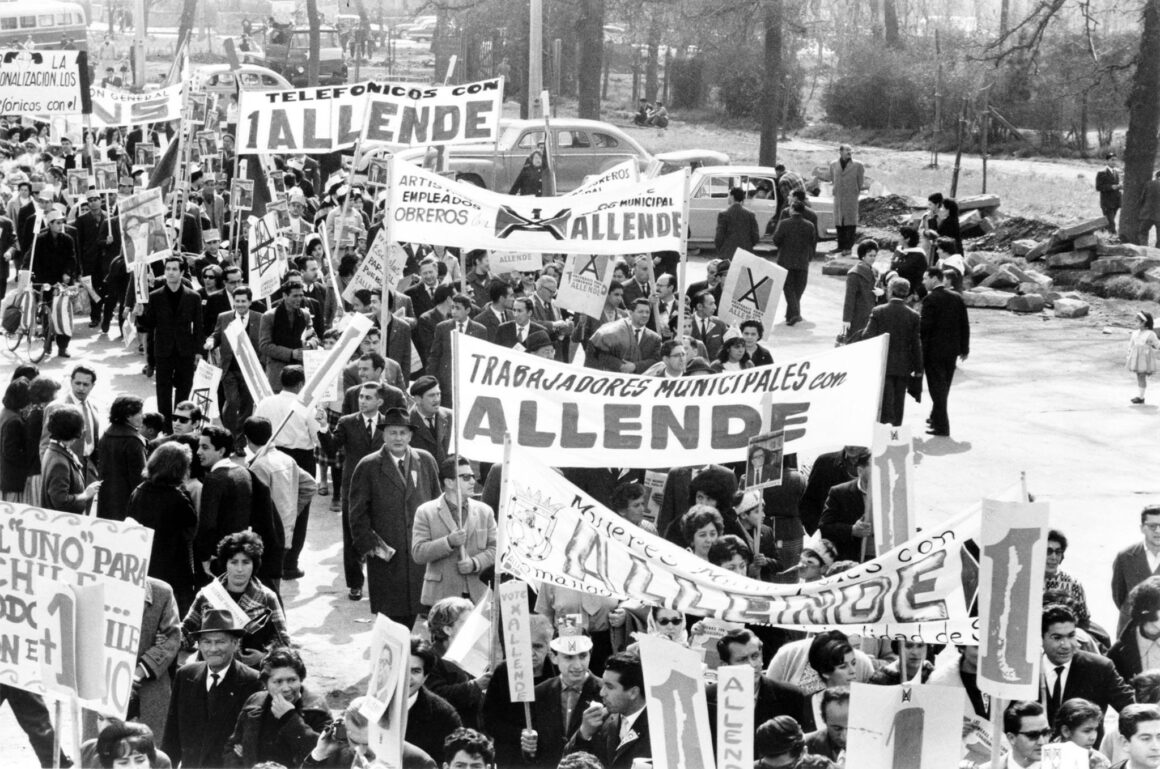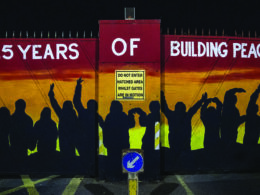By Danny Byrne and Marcus Kollbrunner (International Socialist Alternative)
This September 11 marks, in Latin America and around the world, a half-centenary anniversary of a fundamental event in the history of our continent. It is not a celebration, but a remembrance of a very dark episode: the bloody, brutal and criminal coup d’état that crushed the government of Salvador Allende, defeating the incipient proletarian revolution that had propelled his government to power. The hope that had been awakened by the struggle for revolutionary change was subjected to fear and suffering during a long night of dictatorial repression.
The Chilean 9/11 was an international turning point as well. Pinochet’s dictatorial regime, which rose on the ashes of the coup, imposed a set of attacks on the rights and living standards of the working class, which became a model for global capitalism and imperialism and spread to every corner of the world like an oil stain under the name neoliberalism.
But as we remember this anniversary, our task is not just to mourn. Marxists study history to illuminate the paths of the present and the future. And in analysing these events of 50 years ago, it is clear to us that the problems of the Chilean revolution and its defeat are full of very relevant lessons for those of us who aspire to organise a successful struggle against capitalism and imperialism in the new epoch of disorder that has opened up in the 2020s.
Times of crisis and disorder
Both the 1970s and our own time have been epochs of “permacrisis” — characterised by multiple eruptions of the fundamental contradictions of capitalism. In the 1960s and 1970s, world capitalism entered an international economic crisis — known by the nickname “stagflation” — which represented the exhaustion of the dominant model of economic policy pursued in the post-World War II period. Runaway inflation and brutally rising inequality produced new upsurges of class struggle with workers’ and popular uprisings in every corner of the capitalist world, including multiple revolutionary and pre-revolutionary situations in Europe.
Latin America was no exception, quite the contrary. It was in this context that the Chilean people, led by the working class that had built up a powerful movement over decades, brought Allende to power and led a revolutionary movement. And it was this movement, which achieved the nationalisation of more than 40% of the economy, and which threatened a revolutionary triumph that would open the door to a socialist revolution in the heart of South America, that terrified the protagonists of the September 11 coup, with US imperialism (which today shouts so much about democracy and freedom) in the lead.
Today we see many similarities in the outlook for world capitalism. We are seeing the exhaustion of the “neoliberal” model that had served the capitalists so well since 1973, and the search for a new economic policy to resist the danger of a great world depression. And to the economic crisis, which is deep and serious, we can add an endless list of others. Global imperialism enters the 2020s dragging people and the planet down a path of bloody wars, hunger, oppression and inequality, in the midst of a climate and environmental crisis that knows no limits.
And the response of the working class and the oppressed as a whole has not been long in coming. The wave of social uprisings in recent years has left no region of the world untouched. Admittedly, our movements have not yet reached the level of the heroes of the Chilean revolution, but the prospect of a new prolonged period of gigantic battles between the classes is becoming increasingly clear.
So far in 2023, we have seen huge strike movements around the world, from South Korea to Israel-Palestine to France to South Africa. The Iranian regime was also profoundly undermined by a revolutionary movement unleashed by the femicide and brutal oppression of women by the reactionary mullahs’ regime, part of a global wave of feminist struggle that is still alive and well and has the prospect of continuing. Over the last few years we have seen a major shift in these movements: the working class, its methods of struggle (especially the mass strike) and organisations have increasingly come to the forefront.
And of course, in Latin America, there are very few countries that have not felt the impact of mass movements in the recent period. Colombia and Ecuador have seen repeated social explosions with truly insurrectionary elements. The masses in Peru defeated an attempted institutional coup in 2020 and returned to the streets in 2023 in a hard-fought battle against the reactionary coup that ousted Pedro Castillo. And in Chile itself, the fear of revolution suddenly returned to the minds of the ruling class, when the October 2019 rebellion put the regime in check, challenging the nefarious legacy of Pinochetism that lives on despite the botched “democratic” transition.
The coup in 2023
The 2020s have also shown us that the specter of the coup has certainly not disappeared since the 1970s. Shortly after Peru’s pro-imperialist oligarchy toppled Castillo, the Plaza de los 3 poderes in Brasilia was overrun by gangs of Bolsonarista thugs, desperately wanting to do what Trump could not in 2020 and reverse the results of the presidential election. Likewise the vultures are circling over Gustavo Petro’s presidency.
The lesson of Chile 73 and the whole history of capitalism in the continent is clear to us in this sense: this system is not democratic, and the ruling class will have no reluctance to attack, undermine or even abolish the few democratic rights we have, if they feel that their rule is threatened. Our class cannot rely on the institutions of the system, but only on our own strength, which, when we are fully aware of it and with organisations and leaderships with the capacity and willingness to mobilise it, is superior.
For Marxists, this force can be mobilised and organised, not only to resist the aggressions of capitalist governments but to establish a new, truly democratic system, based on a social revolution that removes the axis of power from the capitalists and imperialists, their “ownership” and control of wealth and key sectors of the economy: a socialist revolution that establishes workers’ democracy.
The failure of reformism
But there is also another factor, in our time, that played a decisive role in the events in Chile in 1973: reformism. The wave of struggles in recent years, in reaction to the crisis of the system and right-wing governments, has helped to push for the election of progressive and left governments in much of our continent. The struggle against Macri generated the return of Kirchnerism in Argentina. Movements in Chile against Piñera led to the election of Boric, who came from the student movement. In Peru, Pedro Castillo, a teacher union leader, was elected, running against the daughter of the former dictator, Keiko Fujimori for the right. In Brazil, Bolsonaro was defeated and Lula returned for a third term. In Colombia, struggles and a general strike ensured a first victory for the left at the national level, with the election of Gustavo Petro.
However, all of these governments face varying degrees of crisis degrees of crisis, due to their inability to push the limits imposed by the system. Even those with a more radical programme, such as Pedro Castillo, quickly went back on their promises to nationalise mineral resources, but still could not avoid a coup d’état by the right-wing congress.
Lula and Petro tried to guarantee “governability” by incorporating centre and right-wing parties into their governments, always at the cost of electoral promises. Petro began his mandate by declaring that he would “develop capitalism”, the same system he denounced as taking the planet to a “point of no return” with environmental destruction.
The defence of this “pragmatic” policy of doing what is “possible” in the face of an unfavourable correlation of forces only leads to further defeats. However, the correlation of forces that seems to exist in the institutions can be changed in the streets, it is a question of struggle. However, it is precisely the confidence in the ability of our class to assert itself that is absent from the leaders of the labour movement and the main left forces. And by lowering expectations and hopes for real change, these governments end up generating demoralisation and demobilisation of movements and struggles.
The problem is compounded when this reformist left defends the institutions of the capitalist state, whose task is precisely to keep this unjust system intact, instead of preparing for an inevitable and necessary break with the system. This was one of the great mistakes of Allende, who preached the defence of “legality” and ended up bringing Pinochet himself into his government to appease the military, which he did not believe would break with the constitution. In Brazil, we see today how the supreme court, the STF, which validated the parliamentary coup against Dilma in 2016, is hailed as a defender and bulwark against the attacks of the extreme right.
All this is aggravated by the policy of promoting small changes that fit the system, trying to be the best managers of capitalism, instead of having a policy to overcome it. We see the limits of the policy of the government of Alberto Fernandes in Argentina, which seeks to manage the crisis and achieve new agreements with the IMF, which does not solve the crisis, but only makes it worse. Argentina has an inflation rate above 100% and poverty is increasing. Likewise in Brazil, the Lula government proposed a new budget policy that maintains the neoliberal logic of spending caps.
This policy opens up the danger that the extreme right, which is growing internationally, will falsely position itself as “anti-system” despite the fact it has a programme to defend the elites by brutally attacking the rights of our class with reactionary policies. All this in a situation where the left is lowering itself to merely defending the system itself.
To stop the threat of the right and the extreme right, it is necessary to rely on the independent struggle of the working class, challenging the limits of the system. Petro has been seen in the last period as an example to many on the left for not simply accepting a “no” to his reforms, reshuffling the government and calling on people to demonstrate. But these demonstrations cannot be limited to pressuring parties to accept concessions (which would be welcome) and open themselves to a return to “normality”. There is no “normality” to look for in the capitalism of the Age of Disorder, marked by crises, especially not in the dependent countries, on the periphery of the system.
In Chile in 1973 we saw a glimpse of what was possible, with the formation of the “cordones industriales”, embryonic alternative bodies of working class power. Pinochet’s coup d’état could have been stopped with the mobilisation of the full force of all the exploited and oppressed sections of our class, if it had before it a political force to carry the struggle to its ultimate consequences. But this would only be possible independently of the institutions and parties that defend the maintenance of the system, and if armed with a programme capable of replacing capitalism, a socialist programme. This is an important lesson for our struggles today.












